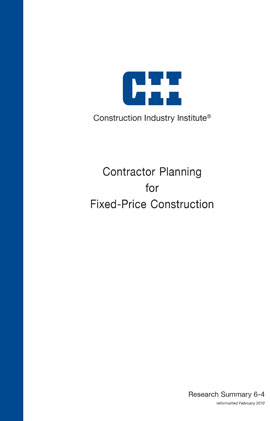
Contractor Planning for Fixed-Price Construction
Good planning is an essential element for successful projects and successful companies, whether construction or otherwise. Planning is the first element in the cycle of planning, controlling, and feedback. Without a plan, there is no basis for control. In addition, feedback from past projects provides a company’s best reference for future planning. Good planning is a characteristic of proactive management.
Good planning begins with the establishment of a planning culture in a company. This culture recognizes that planning is a team effort involving management at all levels. Policy plans establish permanent and semi-permanent guidelines for day-to-day operations of a company and provide the framework for project-specific plans adapted from those guidelines. Strategic plans, updated periodically, chart the long-range course of the company. Tactical plans provide the short-range detail. Operational plans target on a given opportunity.
Construction projects are among the most complicated and challenging of projects to plan and execute in the industrial world. This complexity should be reason enough to endorse the concept of detailed planning of every project. Good planning, however, is often compromised by contractors in the interest of saving time and money. Unfortunately, the record shows the consequences of poor planning to be lost time and money.
Among construction contract types, the most challenging is the fixed-price contract. The contractor has the burden of determining the full scope of the project in terms of items with cost implications, and the burden of identifying and evaluating project risks. In planning a fixed-price construction project, the contractor faces two milestones. First is the bid due date at which time the pricing and other bid submittals must be complete. Second is the mobilization date at which time planning must be complete enough to enable efficient initiation of construction. These two milestones must be treated as successive events in a chain of planning phases, each phase building upon and refining the planning of the previous phase.
(RS6-4, p. 5)
- Policy Planning
- Strategic Planning
- Tactical Planning
- Operational Planning
Project Manager Letter of Instructions – Serves as a compilation of information, strategy, and instruction for project manager responsible for the project/contract.
Project Execution Plan – Planning applied to fixed-price construction that includes work breakdown, cost breakdown structure, project schedule, subcontracting plan, organization structure, responsibility matrix, etc. (RS6-4, p.12)


